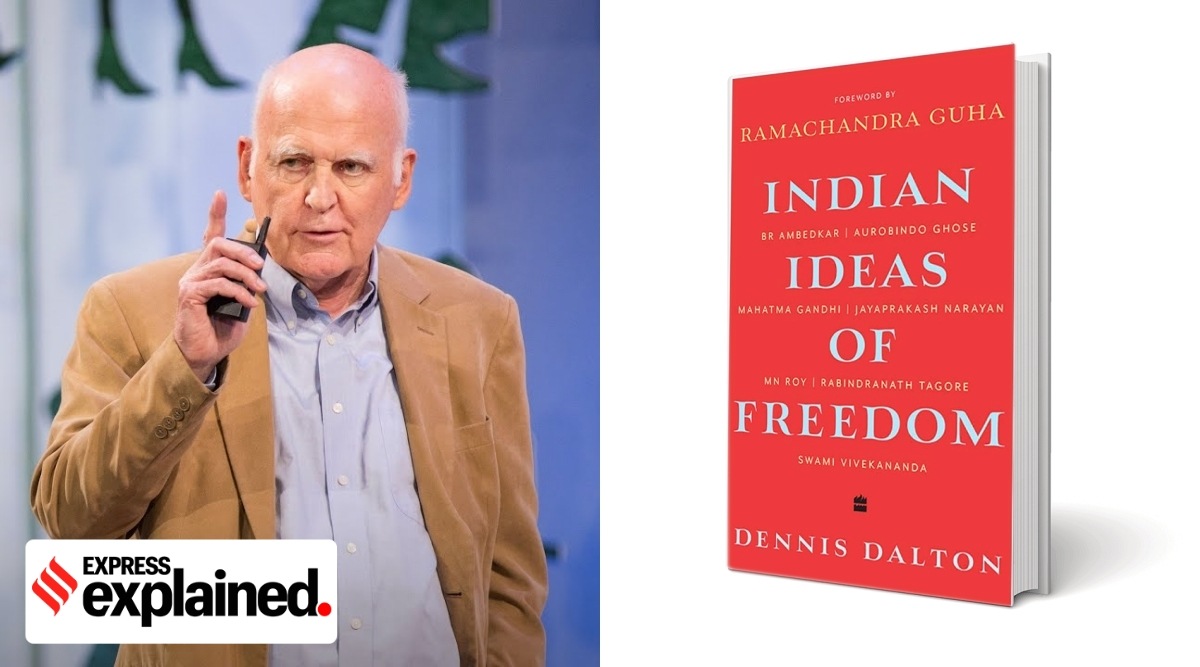Explained Books | An exploration into some Indian ideas of freedom
Dennis Dalton’s ‘Indian Ideas of Freedom’ is an extended edition of his 1982 book which deals with how some of India’s greatest modern thinkers conceptualised the idea of freedom.
 Dennis Dalton's 'Indian Ideas of Freedom' (2023) looks at the concept of freedom from the perspective of seven of India's greatest thinkers of the 20th century. (Photos: Screengrab from YouTube, HarperCollins India)
Dennis Dalton's 'Indian Ideas of Freedom' (2023) looks at the concept of freedom from the perspective of seven of India's greatest thinkers of the 20th century. (Photos: Screengrab from YouTube, HarperCollins India) It is easy to turn historical figures into tropes – to shed them of their complexity and brush over the nuance in their ideas. In doing so, one also creates unassailable dichotomies between different figures when in reality they, and their ideas, may be alike, in more ways than one. Debates are framed, best-sellers written, and ‘narratives’ propagated on such bases.
The reason why Dennis Dalton’s Indian Ideas of Freedom (2023) – a revised version of his 1982 book – is such a refreshing read is because he, very consciously, refrains from doing exactly this, as he looks at the concept of freedom through the eyes of some of India’s greatest visionaries of the 20th century.
Vivekananda, Aurobindo, Gandhi, and Tagore (featured in the original book) and Ambedkar, MN Roy and Jayprakash Narayan (new additions) – seldom does one think of these seven as ideologically alike. In fact, many of their differences are well documented, and not completely ignored by Dalton. Yet, Dalton finds common ground in their respective conceptualisations of freedom and in doing so, provides a coherent thesis on the meaning of freedom.
“ … these leaders of the Indian national movement signify, through their ideas of freedom, aspects of a vital and enduring intellectual tradition.,” Dalton writes.
This intellectual tradition is characterised by a few different themes. Most recurring, is the concept of inner and outer freedom (verbalised in these terms by Gandhi). Simply put, ‘inner freedom’ refers to an individual’s capacity for self realisation whereas ‘outer freedom’ refers to freedom in a more social sense.
Dalton’s seven thinkers all discuss at length the relationship between inner and outer freedom. Notably, unlike the popular Western notions of positive and negative liberty, seen as dichotomous opposites, these thinkers look at inner and outer freedom as deeply connected. As Roy puts it in his Problem of Freedom (1945): “Positive freedom is the condition for the self-realisation of life … Only on that philosophical and psychological foundation can the structure of collective freedom be raised …”
Crucial to this synthesis of inner and outer freedom is the ethics of means and ends. “Let us perfect the means; the end will take care of itself.,” Vivekananda said in a 1900 speech.
While means-ends theory is definitely not unique to these thinkers, their versions, to different degrees, are marked by another connective strand: non-violence. Non-violence as the moral force behind India’s national movement is oft spoken about. Dalton connects the idea of non-violence to the thinkers’ respective conceptualisations of freedom.
Gandhi and Aurobindo (who notably was a revolutionary turned philosopher-saint) provided specific theoretical formulations, while Tagore’s literary works are dotted with the ethics of non-violence. MN Roy and JP, both ardent communists at one time, grew disillusioned with Marxism exactly because of its embracing of violence.
The Indian idea(s) of freedom Dalton speaks about rests on this categorical imperative of non-violence, perhaps best elucidated by Aurobindo in his reflections on Gandhi’s death in 1948: “The Power [of non-violence] that brought us through so much struggle and suffering to freedom will achieve also the aim which occupied the thoughts of the fallen leader [Gandhi] … as it brought us freedom, it will bring us unity.”
For Dalton, this is perhaps India’s greatest and most enduring contribution to the world and the most significant takeaway from his book. At a time when the world – and India – sees a renewed wave of authoritarianism on the rise, Dalton’s book reminds us of India’s own rich intellectual tradition to provide a possible path for an ethical struggle.
Crucially, Dalton is never completely detached from any of the ideas in the book. In the true spirit of the Socratic method, the book’s narrative is carried on the back of Dalton’s astute observations and critical analysis – critique which does not take away from Dalton’s sympathetic lens.
For those intimidated by the general inaccessibility of philosophical writing, Dalton’s book is a must read. Not only is his writing lucid, his approach is such that at no point of time does one get overly burdened by the profundity of the ideas he is discussing. Rather, he carefully knits together a story of these ideas, the historical contexts they emerge in, and the personal journeys of those who came up with them.
=============
Indian Ideas of Freedom
Dennis Dalton
HarperCollins India
528 pages
Rs 576 (paperback)
- 01
- 02
- 03
- 04
- 05





































